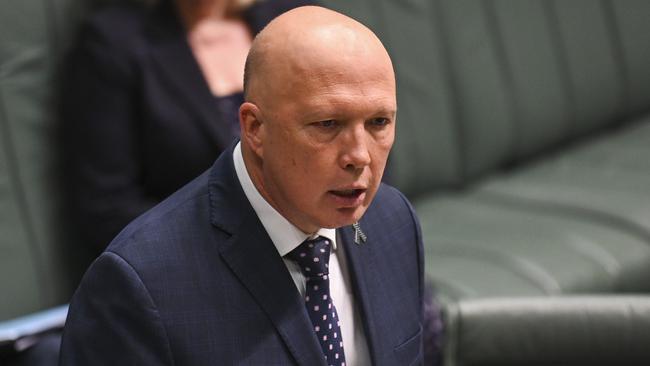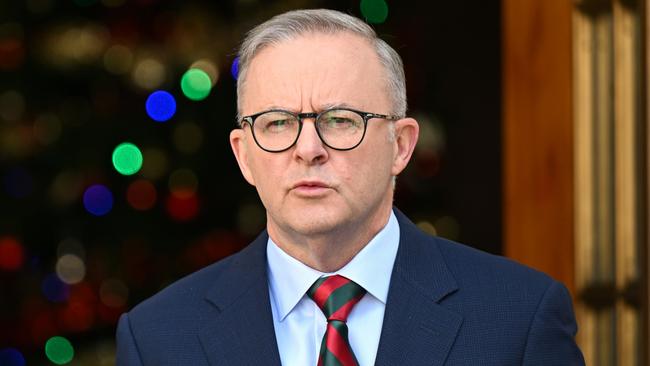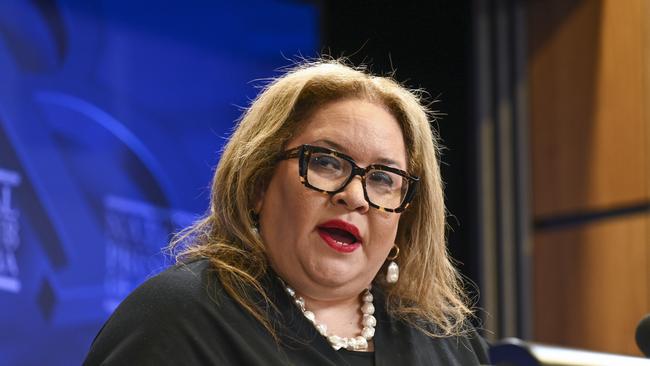Albanese government remains silent over details on Indigenous Voice to Parliament
When it comes to details surrounding the Indigenous Voice to Parliament, Opposition leader Peter Dutton wants clarity but the government remains tight-lipped, writes Clare Armstrong.
Opinion
Don't miss out on the headlines from Opinion. Followed categories will be added to My News.
One week into 2023 and the debate about enshrining an Aboriginal and Torres Strait Islander voice to parliament has already descended into a political tit-for-tat.
Australians would be rightly scratching their heads at a brief exchange between Anthony Albanese and Peter Dutton on Twitter on Sunday after the latter presented 15 questions he wanted the Prime Minister to answer before the referendum.
In an open letter, Dutton had asked for a range of details about the formation, oversight and efficacy of the proposed advisory body.
Instead of engaging on the substantive issues, Albanese’s first response was to fire off a missive on Twitter criticising the mode of delivery.
The PM argued the matter would have been better raised in person when he and Dutton were at a McGrath Foundation fundraiser event at the cricket on Friday.
“People are over cheap culture war stunts,” Albanese said in his tweet.
Later Dutton replied: “Friday at the McGrath Breast Cancer fundraiser wasn’t the place to discuss”.

The bizarre back-and-forth begs the question: how did we get here?
Since the dawn of time – or at the very least the 24-hour media cycle – oppositions have used “open letters” to the government to publicise their concerns or ideas.
In this particular case, the Prime Minister’s office insisted they had not received a copy of the letter before it appeared in newspapers but that’s all rather beside the point.
The incident illustrated how fraught the referendum debate will be this year.
Across the political divide few have adeptly handled the issue to date.
The Nationals have been jumping at shadows – opposed to a proposal that is not yet finalised. The Greens are paralysed by differing priorities, while the undecided Liberals sit perilously on the fence awaiting clarity that Labor has resolutely refused to give.
Defending his letter, Dutton pointed out it was not “racist” or “opposed to reconciliation” to seek basic information about what a voice might look like.
Labor has so far left most of the heavy lifting to a handful of pages in the comprehensive co-design report that steps out options for how the body might function.
This includes the proposed membership – 24 people consisting of two from each state, territory and the Torres Strait, plus five additional regional representatives – as well as suggestions for length of term and the capacity and remit to provide advice to all levels of government.

The problem being, as Dutton has highlighted, this report and the options within it have not been explicitly endorsed as the model the government would follow when establishing the voice.
Dutton has even asked the Government to just rule elements of the report “in or out”.
The Government’s reluctance to definitively answer some of the questions Dutton set out in his letter to Albanese over the weekend was not totally without cause.
The voice model itself would not be enshrined in the constitution, so it would be unwise to send Australians into the ballot box to vote purely based on a 2023 concept that may not exist in the years and decades to come.
The issue at the heart of the referendum is a principled one: should Indigenous Australians be able to directly inform parliament about issues impacting their communities.
But however conceptual the question, the proposal cannot be totally divorced from the mechanics.

Many proponents of the voice have argued it can deliver practical policy outcomes and the public are naturally curious about how that could occur.
The Government has been reticent to directly respond to demands for “detail” over fears to do so would further entrench a perception the voice was a “Labor proposal”.
It was in this vein that Albanese left it to Uluru Dialogue co-chair Professor Megan Davis to provide a considered response to Dutton’s open letter.
In a statement Davis confirmed “there will be detail before the referendum” with work underway to determine the “appropriate amount” required for an “informed” vote.
Succinct and to the point.
It begs the question why it was necessary for the PM to take a swipe on Twitter at all.
Short term political point-scoring risked undermining the Government’s own argument that the voice was not a partisan issue.
Dutton’s questions were not out of order and Davis’ response confirmed the matter of detail was being actively considered.
For months, government insiders have insisted work has diligently been taking place behind the scenes on resources and plans to deliver a successful referendum result.
Soon the public will have full view of exactly what they have been working on, and this could well be enough for Dutton to support the proposal.
By the end of this year the question of enshrining an Indigenous advisory body in Australia’s constitution will be definitively answered but, for now, the devil remains in the detail.





